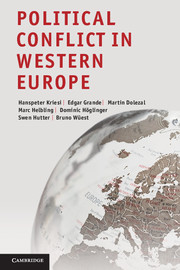Book contents
- Frontmatter
- Contents
- List of Figures
- List of Tables
- Preface and acknowledgments
- Part I Theory and methods
- Part II The development of the ‘integration–demarcation’ cleavage
- 3 Participation and party choice: comparing the demand side of the new cleavage across arenas
- 4 Restructuring the national political space: the supply side of national electoral politics
- 5 Restructuring the European political space: the supply side of European electoral politics
- 6 Restructuring protest politics: the terrain of cultural winners
- 7 Congruence, counterweight, or different logics? Comparing electoral and protest politics
- Part III Public debates: the articulation of the new cleavage in detail
- Part IV Conclusion
- References
- Index
7 - Congruence, counterweight, or different logics? Comparing electoral and protest politics
Published online by Cambridge University Press: 05 August 2012
- Frontmatter
- Contents
- List of Figures
- List of Tables
- Preface and acknowledgments
- Part I Theory and methods
- Part II The development of the ‘integration–demarcation’ cleavage
- 3 Participation and party choice: comparing the demand side of the new cleavage across arenas
- 4 Restructuring the national political space: the supply side of national electoral politics
- 5 Restructuring the European political space: the supply side of European electoral politics
- 6 Restructuring protest politics: the terrain of cultural winners
- 7 Congruence, counterweight, or different logics? Comparing electoral and protest politics
- Part III Public debates: the articulation of the new cleavage in detail
- Part IV Conclusion
- References
- Index
Summary
Introduction
In previous chapters, we showed that globalization has led to new political potentials on the demand side, and that these potentials have restructured political mobilization in turn. The patterns of change differ significantly when we focus on particular sites of political mobilization, however. The protest politics arena continues to be far more shaped by issues, such as cultural liberalism and environment, which emerged during the 1970s and 1980s, than does the electoral arena. During those years, the driving forces of political change were located on the political left in general and in new social movements more specifically. Since the 1990s, the momentum has shifted to the right (Kitschelt 1995), with its driving force, the populist radical right, forcefully restructuring party competition. While the main ‘new’ issues linked to globalization, namely immigration and Europe, seem to be more salient in electoral politics, protest politics is mainly the site of those who try to counter the rise of the radical right.
The main goal here is to elaborate these cross-arena differences and explain differing patterns of change. We do so by focusing on the relationship between electoral and protest politics, and argue that the shift from left to right is the source of the differing development paths the conflict structures have taken in electoral as compared to protest politics. We think there are different logics at work. The left waxes and wanes at the same time in both arenas, while, for the right, when its actors and issue positions become more salient in one arena, their salience decreases in the other one. We trace these differences back to the different value orientations and strategies of the actors involved.
- Type
- Chapter
- Information
- Political Conflict in Western Europe , pp. 182 - 204Publisher: Cambridge University PressPrint publication year: 2012
- 2
- Cited by

